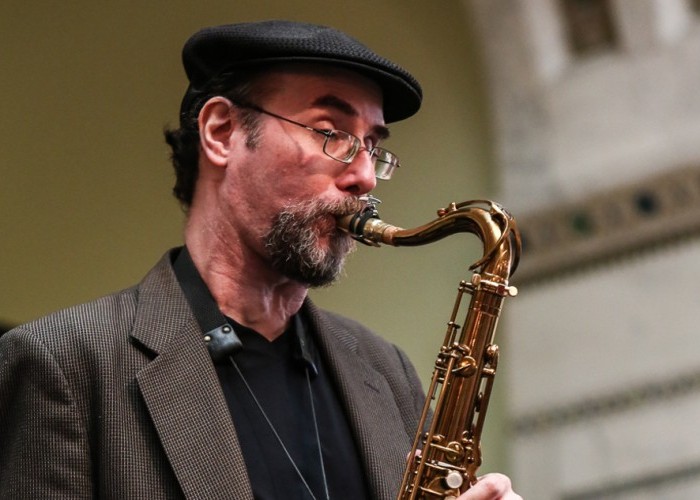Jan 13, 2026 2:09 PM
More Trump-Kennedy Center Cancellations
The fallout from the renaming of the John F. Kennedy Center for the Performing Arts to include President Donald…

Multi-reedist and educator Greg Fishman has published three volumes of his Jazz Saxophone Etudes series.
(Photo: Mark Sheldon)Saxophones surround multi-reedist Greg Fishman every time he walks into his Evanston, Illinois, studio and he’d never want it any other way. Fishman composes and teaches in a cozy room at the front of his friend Paul Maslin’s PM Woodwind repair shop and retail store. During an afternoon conversation, Fishman does not need to point out that the array of players, students and their instruments in the shop reflect how he has become a cottage industry himself.
Fishman has worked throughout Chicago since he was a teenage professional in the 1980s and has toured the world with jazz legends. He brings these experiences to informative and distinctive instructional books that he wrote and self-published. Along with teaching numerous students in person and via Skype, Fishman recently released the album So You Say. His performances and teaching zeal come from the same source.
“I’ve loved playing since I was 12, practicing 8 hours a day, because I loved doing it every minute,” Fishman said. “In those hours, I figured out ways the music made sense to me and figured out a way of explaining it that was relatable to other people.”
One wall of Fishman’s studio includes photos of his times with an array of mentors—including Stan Getz, James Moody and Joe Henderson. He watched them work, listened to their stories and included these life lessons into his own bandstand and classroom interactions. When Fishman started teaching, he realized that students had a different attitude about learning music.
“Students can be obsessed with playing the right notes, right scales, technical things,” Fishman said. “For the experienced players, it’s more about interaction with the group and communicating something to the audience—portraying a mood while they’re playing.”
Also, Fishman wanted to guide students who had not achieved considerable technique. So, he began writing saxophone etudes that help players develop a professional-level vocabulary, but aren’t “so daunting that somebody wouldn’t be able to play it.” After touring Japan alongside Michael Brecker in 2002, the legendary saxophonist encouraged Fishman to compile those pieces. He released the successful first volume of Jazz Saxophone Etudes three years later. Since then, Fishman has written guides to duet playing, phrasing and harmony with accompanying discs. His lively The Lobster Theory (2014) uses imaginative analogies to describe improvisation.
“When I saw people were confused, not getting the beauty of improvisation, I’d come up with some analogy with whatever they did or relate a concept about music to some everyday event,” Fishman explained.
Fishman’s tenor saxophone exchanges with California-based Doug Webb constitute So You Say. This reflects his regard for the tradition of such duos as Sonny Stitt and Gene Ammons. Both Fishman and Webb also believed that the album should emphasize first or second takes, recorded quickly in the studio, as if it were a live performance. In addition to several high-octane, uptempo numbers, Fishman’s ballad “Harlem Avenue” is a highlight of the program.
Webb believes that their differing styles are complementary. “Greg is more precise, very methodical,” Webb said. “Anything he can play, he can turn around and play it up a half step. I just tried to improvise and have fun.”
For all of Fishman’s jobs, a weekly gig might be the most relaxing. Every Sunday he performs with his wife, vocalist/pianist Judy Roberts, at Marie’s Pizza, a restaurant located on Chicago’s northwest side. As they ran through sets of Great American Songbook and Brazilian standards one summer night, the audience laughed along with Fishman’s comments about key changes. Winning over a boisterous post-Cubs game crowd came down to not over-thinking things.
“Nothing is rehearsed, we don’t know what we’re going to do, we never discuss anything,” Fishman said. “It was like that the first day we played together and it’s like that every time we play. That’s how it should be.” DB

Belá Fleck during an interview with Fredrika Whitfield on CNN.
Jan 13, 2026 2:09 PM
The fallout from the renaming of the John F. Kennedy Center for the Performing Arts to include President Donald…

Peplowski first came to prominence in legacy swing bands, including the final iteration of the Benny Goodman Orchestra, before beginning a solo career in the late 1980s.
Feb 3, 2026 12:10 AM
Ken Peplowski, a clarinetist and tenor saxophonist who straddled the worlds of traditional and modern jazz, died Feb. 2…

The success of Oregon’s first album, 1971’s Music Of Another Present Era, allowed Towner to establish a solo career.
Jan 19, 2026 5:02 PM
Ralph Towner, a guitarist and composer who blended multiple genres, including jazz — and throughout them all remained…

Rico’s Anti-Microbial Instrument Swab
Jan 19, 2026 2:48 PM
With this year’s NAMM Show right around the corner, we can look forward to plenty of new and innovative instruments…

Richie Beirach was particularly renowned for his approach to chromatic harmony, which he used to improvise reharmonizations of originals and standards.
Jan 27, 2026 11:19 AM
Richie Beirach, a pianist and composer who channeled a knowledge of modern classical music into his jazz practice,…